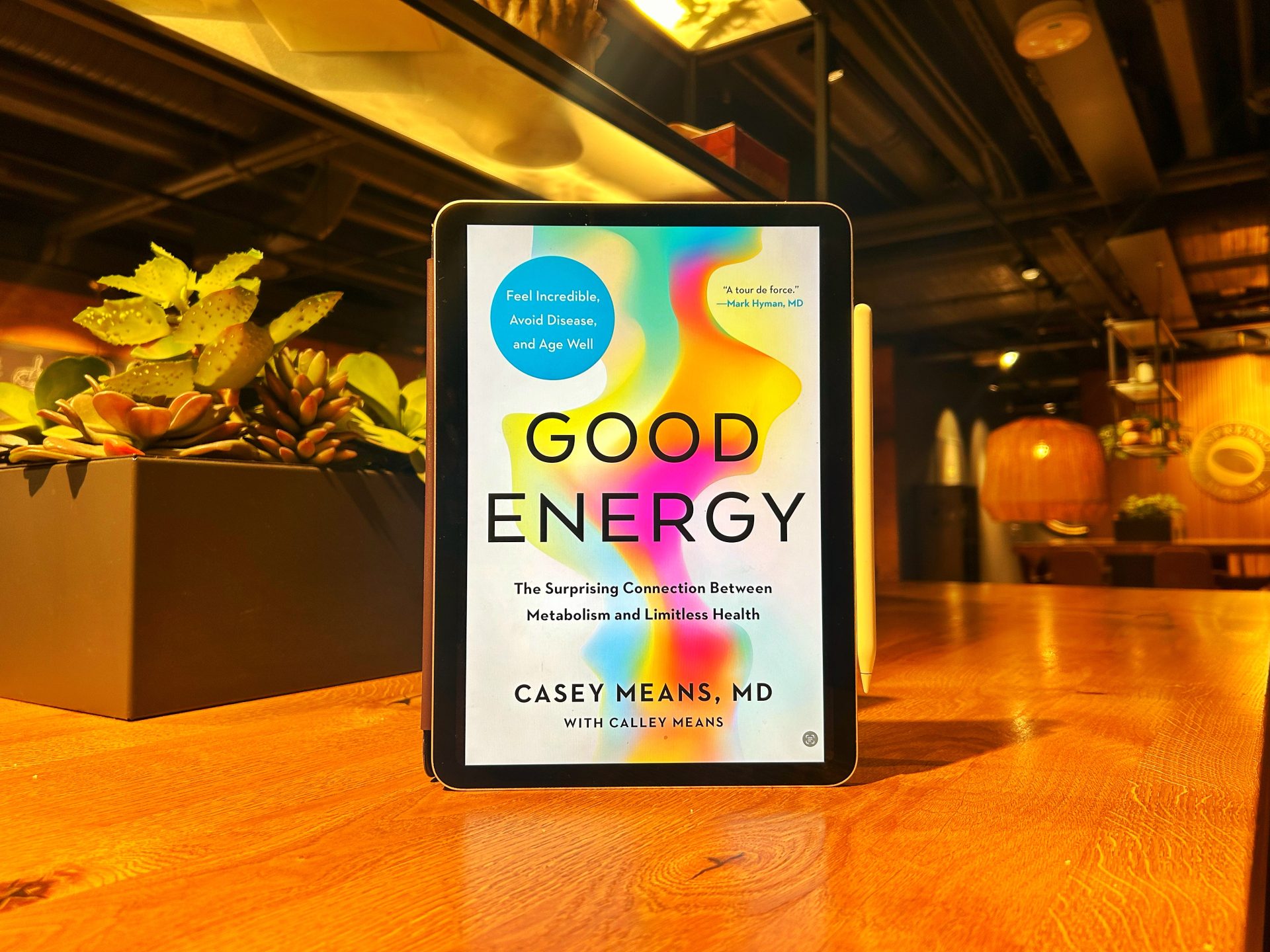Good Energy lives up to its title by focusing on the importance of maintaining a healthy lifestyle through managing energy in the body. The spotlight of this book is mitochondria, the tiny powerhouses in our cells, and explains how keeping them in good shape is crucial for overall health.
Don’t worry about getting overwhelmed in too much science. Each chapter wraps up with a handy summary, making the information easy to digest. Plus, there’s a fun quiz to help you focus your energy on important areas like food, sleep, exercise, and even your mindset.
What I loved about this book is how the authors break down complex science into simple, everyday language. It’s full of practical tips and suggestions that make it easy to rethink and improve your lifestyle. In addition, this book does not suggest you follow an unrealistic diet that can only last several months or possibly years. Instead, the focus is on mindful eating and a lifestyle that can be maintained for your whole life.
Just when you think it couldn’t get any more practical, the author shares some fantastic “Good Energy” recipes in the final section. The book goes into detail about how to make your kitchen a hub of good energy and offering tips to support a healthier lifestyle.
Good Energy: The Surprising Connection Between Metabolism and Limitless Health is not just about health and fitness; it’s a science guide and a health cookbook rolled into one. Whether you’re curious about the science behind good health or just looking for some tasty, energy-boosting recipes, “Good Energy” has got you covered.
Summary
Good Energy: The Key to Health
Understanding Metabolic Health
Metabolic health, often referred to as “Good Energy,” is crucial for maintaining great mental and physical health. It involves the efficient functioning of our cells, which rely on ATP (adenosine triphosphate) to perform various essential activities:
- Protein Synthesis
- DNA Repair and Regulation
- Cell Signaling
- Nutrient Transport
- Homeostasis
- Cell Waste Cleanup and Autophagy
- Metabolism
Every cell needs the right resources to produce ATP. When our mitochondria, the energy factories of our cells, don’t have the right conditions or are overloaded with harmful substances, they can’t produce enough ATP. This leads to poor cellular function, and ultimately, poor health.
Environmental Impact on Metabolic Health
Our environment has changed drastically over recent decades, affecting our diet, movement patterns, sleep, stress levels, and exposure to non-natural chemicals. These changes have disrupted our metabolic functions, leading to broken cells, organs, and overall poor health.
Mitochondria: The Energy Producers
Mitochondria are vital for converting the food we eat into usable energy (ATP). However, modern lifestyles and diets are damaging our mitochondria. Here’s how:
- Overnutrition: Consuming too many calories and macronutrients.
- Nutrient Deficiencies: Lack of essential vitamins and minerals.
- Microbiome Issues: Poor gut health.
- Sedentary Lifestyle: Lack of physical activity.
- Chronic Stress: High cortisol levels inhibit mitochondrial production.
- Medications and Drugs: Harmful side effects on mitochondria.
- Sleep Deprivation: Poor sleep affects energy production.
- Environmental Toxins: Exposure to pollutants and chemicals.
- Artificial Light: Disrupts circadian rhythms.
- Thermoneutrality: Lack of exposure to varying temperatures.
The Trifecta of Dysfunction
These dysfunctions leads to bad energy:
- Mitochondrial Dysfunction: Reduced ATP production and fat storage in cells.
- Chronic Inflammation: Persistent immune response due to perceived threats.
- Oxidative Stress: Damage from free radicals created by stressed cells.
Metabolic Syndrome
Metabolic syndrome is diagnosed when you have three or more of the following:
- Fasting Glucose: 100 mg/dL or higher
- Waist Circumference: More than 35 inches for women and 40 inches for men
- HDL: Less than 40 mg/dL for men and 50 mg/dL for women
- Triglycerides: 150 mg/dL or higher
- Blood Pressure: 130/85 mmHg or higher
5 Key Metabolic Biomarkers
- Triglycerides:
- Normal: <150 mg/dL
- Optimal: <80 mg/dL
- HDL:
- Men: >40 mg/dL
- Women: >50 mg/dL
- Optimal: 50-90 mg/dL
- Fasting Glucose:
- Normal: <100 mg/dL
- Optimal: 70-85 mg/dL
- Blood Pressure:
- Normal: <120/80 mmHg
- Waist Circumference:
- Men: <102 cm
- Women: <88 cm
- Optimal: Men <90 cm, Women <80 cm
Good Energy Diet Essentials
For optimal metabolic health, your meals should include:
- Micronutrients and Antioxidants
- Omega-3 Fatty Acids
- Fiber
- Fermented Foods
- Protein
Strategies to Control Blood Sugar
- Avoid “Naked Carbohydrates”: Pair carbs with protein, fats, or fiber to slow digestion.
- Meal Sequencing: Eat low-glycemic foods first.
- Eat Earlier: earlier meals cause lower glucose spikes in compare to late night meals.
- Tighten Eating Window: Eat within a shorter time frame.
- Avoid Liquid Sugar: Reduces rapid glucose spikes.
- Add Fiber: Slows digestion.
- Use Food Adjuncts: Vinegar and cinnamon can lower glucose responses.
- Post-Meal Walks: Reduce glucose impact.
- Mindful Eating: Lower stress and improve digestion.
The Importance of Sleep
Proper sleep regulates hormones, metabolism, weight, and disease risk. Exposure to natural light during the day boosts insulin sensitivity and serotonin levels, which help control appetite and improve glucose control. Poor sleep affects mitochondrial function, oxidative stress, and inflammation.
The Importance of Movement
Regular muscle contraction:
- Increases calcium entry into cells, boosting ATP production.
- Disposes of excess glucose without insulin.
- Stimulates AMPK, enhancing fat burning, glucose uptake, and mitochondrial production.
Managing Stress
Regardless of diet, exercise, or sleep quality, high stress levels can negate all other health benefits. Managing stress is crucial for maintaining cellular health and overall well-being.
Author: Casey Means, MD with Calley Means
Publication date: 14 May 2024
Number of pages: 400 pages





Leave a Reply